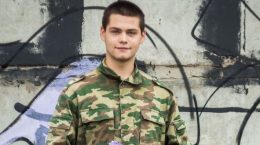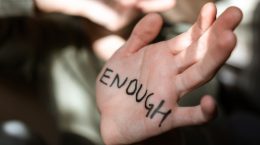“Nash Dom” wants to pay your attention at the case of Nasser Milad, who was detained under the Article 328, when he was 17 years old. The expert opinion was prepared by lawyers and human rights defenders of “Nash Dom” based on the materials of the criminal case.
Chapter 1. A brief description of the case.
Chapter 2. Violation of the rights of a minor during detention, arrest and trial.
Chapter 3. Expert opinion
Chapter 1. Brief description of the case: Minor Nasser Milad (born on November 16, 1999), basic education, worked as an auxiliary worker for an individual entrepreneur. He was previously convicted under Part 1 of Art. 328 of the Criminal Code of the Republic of Belarus, the term of the unserved sentence is 11 months and 22 days. In 2016 he was sentenced to two years probation as a consumer. At the time he was put on the register and dropped the phrase that he would be locked up next time. All this time (from 2016 to 2018) Milad was constantly reporting to the police, he was detained several times, no drugs were found on him, but every time he was told: we will put you in jail anyway. The family’s apartment was searched about five times without a prosecutor’s approval, but nothing was found.
In 2017, the guy and his friends were in the apartment when the security forces broke into it. They grabbed first the neighbor, and then the grandmother Milad. It was only when the guy started to work out what was going on that he was shown the document. The police searched the whole flat. They demanded the drugs be handed over amicably. Milad was taken to the police station, but then released. Over the next year, there were several more arrest attempts, his phone was wiretapped, but no charges were filed.
Once again Milad was detained when he came to check in with the police. He did not have any drugs on him. According to the investigation, Nasser Milad, from May 2017 to August 30, 2017, joined an organized group created and headed by an unidentified person (“MIMI Corporation”), engaged in criminal activities in the sphere of illegal circulation of dangerous narcotic drugs, especially dangerous psychotropic substances.
Nasser Milad did not fully admit his guilt.
The investigation found “the conspicuous presence of an unidentified organizer and leader, as well as Nasser Milad, who was the highest-ranking person” in relation to the other participants.
During the investigation, Milada’s lawyer suggested that he admit his participation in group acts, promising that in this case the guy would be sentenced not to 15-17, but 12-15 years in prison. Milad pleaded not guilty and no evidence was presented in court to qualify the case under Article 328 part 4. However, he was sentenced as a member of an organized drug distribution group
Chapter 2. Violations of the rights of a minor in criminal proceedings:
2.1 Detention and application of a preventive measure:
Naser Milad was detained from 3 August 2017 to 4 August 2017 and from 30 August 2017 to 31 August 2017. From his explanations it follows that on 3 August 2017 he received a call from a district police officer asking him to come to the Moskovsky police station. The guy asked an acquaintance to give him a lift, and he was detained at the police station. The police had information that Milad was involved in drug trafficking and had him under covert surveillance.
During a personal search, no drugs were found in his possession, but in the car of the friend who gave him a lift, there was correspondence about the cache of bookmarks, as well as marijuana. According to a friend, it was Milad who gave him drugs. Milad, in turn, claimed that he had not used the phone left in the car for a long time. Due to the lack of drugs with him, Milad was released.
On August 30, Milad was detained during the covert operational-search measures “control in telecommunication networks” and covert surveillance. No drugs were found with him.
During the arrest, search and questioning, legal representatives were not present.
Milad has been in pre-trial detention since 1 September 2017.
Rule 10.2 of the Beijing Rules provides that when a juvenile is detained, the judge or other competent officer or authority shall promptly consider the question of release.
When deciding on the preventive measure, the grounds, motives and possibilities of another, milder preventive measure, including the placement of a juvenile under supervision in accordance with the procedure set out in Article 123 of the Code of Criminal Procedure of the Republic of Belarus, were not examined.
The preventive measure selected was not justified by the investigation. The necessity and appropriateness of Nasser Milad’s detention pending trial was not indicated.
The investigation had no reason to believe that without the application of this preventive measure, the minor Nasser Milad would have obstructed the investigation of the criminal case and its consideration in court. Or would have attempted to hide from the investigation or the court, or otherwise hindered the establishment of the truth in the criminal case. All of the above does not correspond to the increased legal protection of the rights of a minor.
According to Rule 13 of the Beijing Rules, pretrial detention should only be used as a last resort and for the shortest period of time.
The danger of ‘criminal influence’ on juveniles in pre-trial detention should not be underestimated, nor should alternative measures be applied without good reason.
2.2 The principle of increased legal protection of minors in criminal proceedings:
During the investigation and court proceedings, the environment and conditions in which the minor Nasser Milad lived were not thoroughly investigated. The circumstances in which he became part of a criminal group organised by an unidentified adult were not established. There was no attempt to open a criminal case against the group leader. Based on the materials of the case, they did not even try to establish him/her. The verdict was influenced by the fact that it was the second conviction for Milad. At the same time, it was not specified that the preventive work was carried out formally.
According to Rule 16 of the Beijing Rules, in all cases other than minor offenses, the environment and conditions of the juvenile, or the circumstances in which the offense was committed, should be carefully examined before the competent authority makes a final decision prior to sentencing in order to facilitate the issuance by the competent authority of a reasonable judgment in the case.
Chapter 3. Expert opinion
According to paragraph 53 of the United Nations Guidelines for the Prevention of Juvenile Delinquency (Riyadh Guidelines), adopted by General Assembly resolution 45/112 of 12/14/1990, legislation prohibiting the abuse of children and young people should be adopted and enforced and their exploitation, as well as their use as a weapon in criminal activities.
However, the organizer and head of the “MIMI Corporation” criminal group, who used the underage Nasser Milad as a weapon in his criminal activities, was not established by the investigation, despite repeated contacts, correspondence of the group members with him. Almost all responsibility for the activities of the group was assigned to the underage Nasser, who, according to the investigation and the court, “had a higher level in relation to” other participants.
According to paragraph 58 of the Riyadh Guidelines, law enforcement officials and other relevant personnel, regardless of gender, should be prepared to take into account the special needs of young people in their work. Also be aware of and make use, to the greatest extent possible, of programmes and available assistance services to prevent juveniles from coming into contact with the justice system.
Nasser M., a juvenile previously convicted under article 328, part 1, of the Criminal Code received no assistance from the relevant services to prevent further unlawful behaviour. Also, no preventive work was carried out with him by state bodies.
According to rule 1.2. The Standard Minimum Rules for the Administration of Juvenile Justice (the Beijing Rules), approved by UN General Assembly Resolution 40/33 on November 29, 1985, states that states should strive to create conditions that allow a meaningful life for adolescents in society, which, at that time life, when she or he is most prone to misbehavior, will be conducive to the process of personal development and education, as much as possible free from the possibility of committing crimes and offenses.
No positive steps have been taken by the state to reduce and eliminate the need for further intervention by the law and effective, fair and humane treatment of a juvenile in conflict with the law. The court did not make any legal assessment of the negligence and inaction of the state authorities which had led to the involvement of minor Nasser Milad in criminal activity on the part of adults.








